Richard Branson's Entrepreneurial Journey: An Analysis of Success
VerifiedAdded on 2022/09/14
|9
|2590
|14
Report
AI Summary
This report provides an in-depth analysis of Richard Branson, founder of the Virgin Group, examining his entrepreneurial characteristics and traits. It explores his background, leadership style, and innovative approach to business. The report delves into Branson's ability to recognize opportunities, develop ideas, and create competitive advantages in diverse markets. It discusses his strategies for building a successful business, including his focus on employee empowerment, customer satisfaction, and corporate social responsibility. The report highlights the application of relevant entrepreneurship theories to Branson's career, providing a comprehensive overview of his entrepreneurial journey and offering recommendations for future business endeavors.

Entrepreneurship
Paraphrase This Document
Need a fresh take? Get an instant paraphrase of this document with our AI Paraphraser
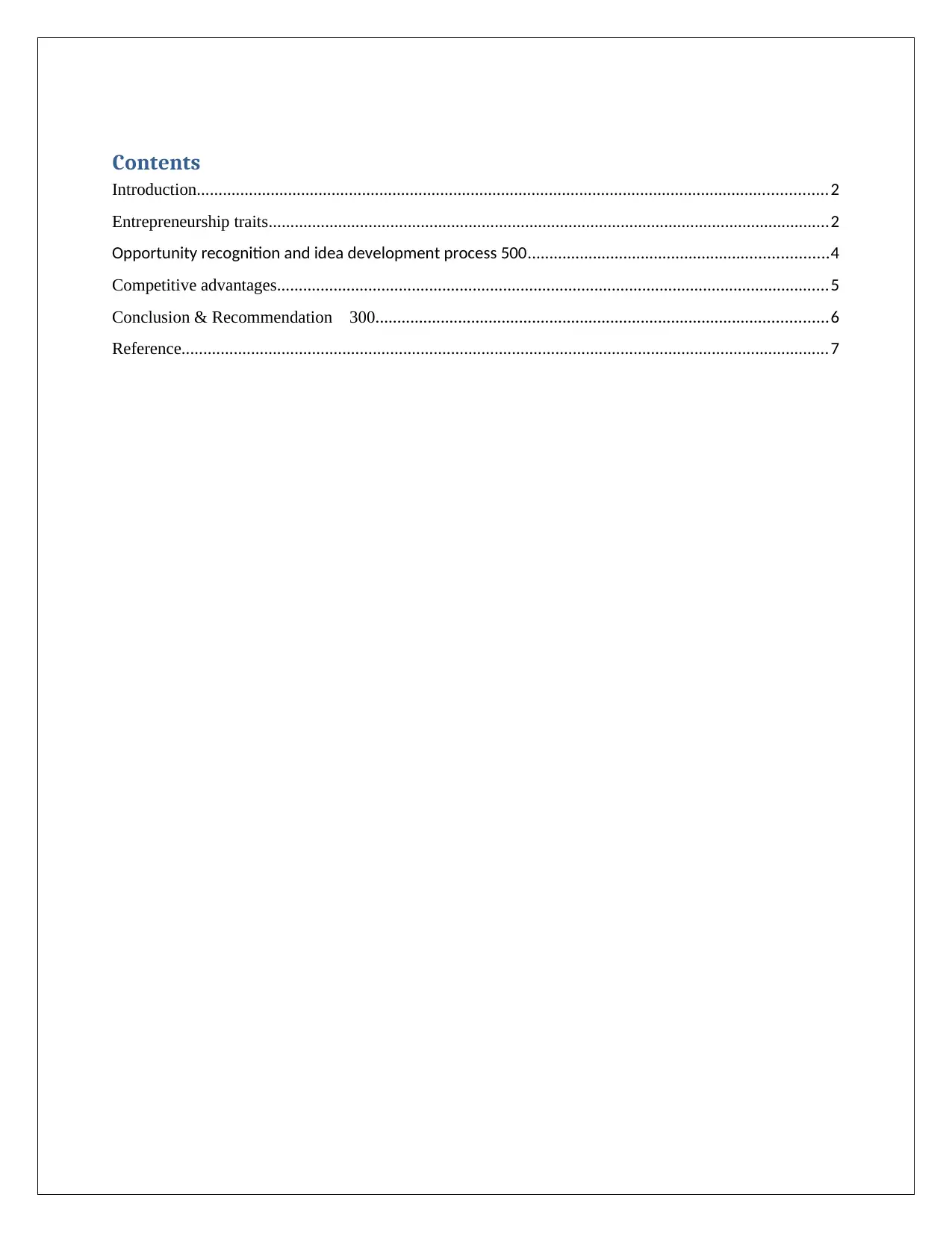
Contents
Introduction.................................................................................................................................................2
Entrepreneurship traits.................................................................................................................................2
Opportunity recognition and idea development process 500.....................................................................4
Competitive advantages...............................................................................................................................5
Conclusion & Recommendation 300........................................................................................................6
Reference.....................................................................................................................................................7
Introduction.................................................................................................................................................2
Entrepreneurship traits.................................................................................................................................2
Opportunity recognition and idea development process 500.....................................................................4
Competitive advantages...............................................................................................................................5
Conclusion & Recommendation 300........................................................................................................6
Reference.....................................................................................................................................................7
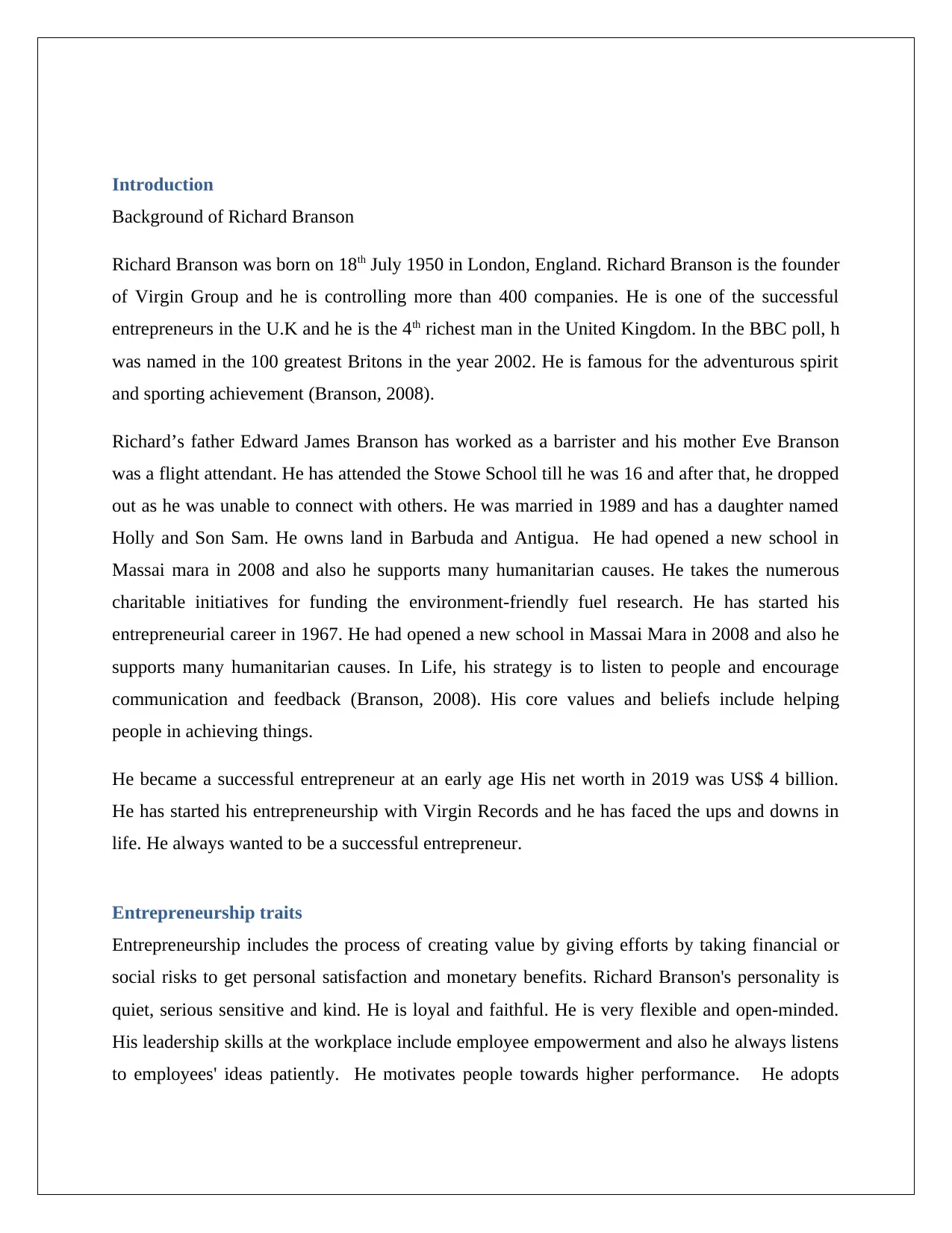
Introduction
Background of Richard Branson
Richard Branson was born on 18th July 1950 in London, England. Richard Branson is the founder
of Virgin Group and he is controlling more than 400 companies. He is one of the successful
entrepreneurs in the U.K and he is the 4th richest man in the United Kingdom. In the BBC poll, h
was named in the 100 greatest Britons in the year 2002. He is famous for the adventurous spirit
and sporting achievement (Branson, 2008).
Richard’s father Edward James Branson has worked as a barrister and his mother Eve Branson
was a flight attendant. He has attended the Stowe School till he was 16 and after that, he dropped
out as he was unable to connect with others. He was married in 1989 and has a daughter named
Holly and Son Sam. He owns land in Barbuda and Antigua. He had opened a new school in
Massai mara in 2008 and also he supports many humanitarian causes. He takes the numerous
charitable initiatives for funding the environment-friendly fuel research. He has started his
entrepreneurial career in 1967. He had opened a new school in Massai Mara in 2008 and also he
supports many humanitarian causes. In Life, his strategy is to listen to people and encourage
communication and feedback (Branson, 2008). His core values and beliefs include helping
people in achieving things.
He became a successful entrepreneur at an early age His net worth in 2019 was US$ 4 billion.
He has started his entrepreneurship with Virgin Records and he has faced the ups and downs in
life. He always wanted to be a successful entrepreneur.
Entrepreneurship traits
Entrepreneurship includes the process of creating value by giving efforts by taking financial or
social risks to get personal satisfaction and monetary benefits. Richard Branson's personality is
quiet, serious sensitive and kind. He is loyal and faithful. He is very flexible and open-minded.
His leadership skills at the workplace include employee empowerment and also he always listens
to employees' ideas patiently. He motivates people towards higher performance. He adopts
Background of Richard Branson
Richard Branson was born on 18th July 1950 in London, England. Richard Branson is the founder
of Virgin Group and he is controlling more than 400 companies. He is one of the successful
entrepreneurs in the U.K and he is the 4th richest man in the United Kingdom. In the BBC poll, h
was named in the 100 greatest Britons in the year 2002. He is famous for the adventurous spirit
and sporting achievement (Branson, 2008).
Richard’s father Edward James Branson has worked as a barrister and his mother Eve Branson
was a flight attendant. He has attended the Stowe School till he was 16 and after that, he dropped
out as he was unable to connect with others. He was married in 1989 and has a daughter named
Holly and Son Sam. He owns land in Barbuda and Antigua. He had opened a new school in
Massai mara in 2008 and also he supports many humanitarian causes. He takes the numerous
charitable initiatives for funding the environment-friendly fuel research. He has started his
entrepreneurial career in 1967. He had opened a new school in Massai Mara in 2008 and also he
supports many humanitarian causes. In Life, his strategy is to listen to people and encourage
communication and feedback (Branson, 2008). His core values and beliefs include helping
people in achieving things.
He became a successful entrepreneur at an early age His net worth in 2019 was US$ 4 billion.
He has started his entrepreneurship with Virgin Records and he has faced the ups and downs in
life. He always wanted to be a successful entrepreneur.
Entrepreneurship traits
Entrepreneurship includes the process of creating value by giving efforts by taking financial or
social risks to get personal satisfaction and monetary benefits. Richard Branson's personality is
quiet, serious sensitive and kind. He is loyal and faithful. He is very flexible and open-minded.
His leadership skills at the workplace include employee empowerment and also he always listens
to employees' ideas patiently. He motivates people towards higher performance. He adopts
⊘ This is a preview!⊘
Do you want full access?
Subscribe today to unlock all pages.

Trusted by 1+ million students worldwide
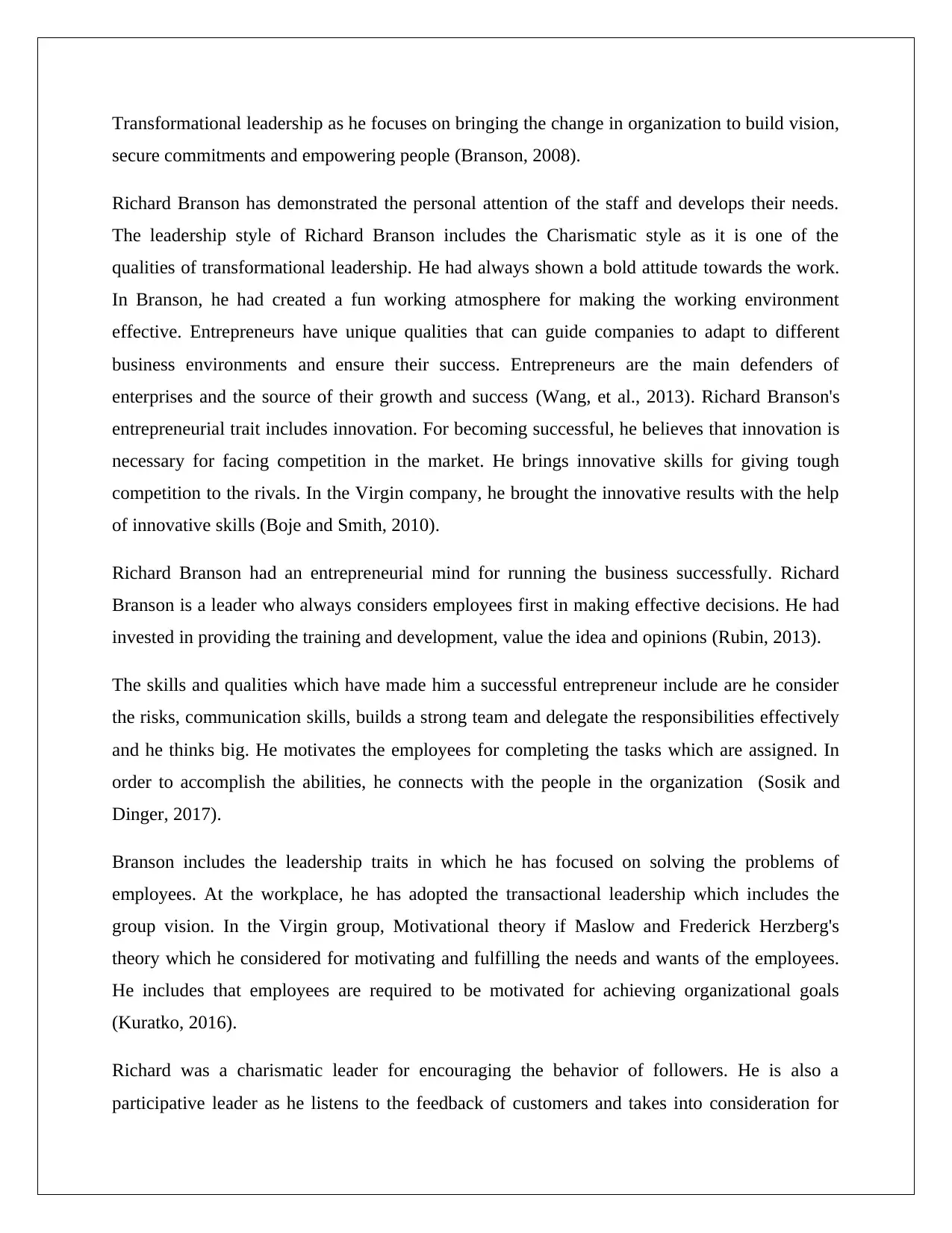
Transformational leadership as he focuses on bringing the change in organization to build vision,
secure commitments and empowering people (Branson, 2008).
Richard Branson has demonstrated the personal attention of the staff and develops their needs.
The leadership style of Richard Branson includes the Charismatic style as it is one of the
qualities of transformational leadership. He had always shown a bold attitude towards the work.
In Branson, he had created a fun working atmosphere for making the working environment
effective. Entrepreneurs have unique qualities that can guide companies to adapt to different
business environments and ensure their success. Entrepreneurs are the main defenders of
enterprises and the source of their growth and success (Wang, et al., 2013). Richard Branson's
entrepreneurial trait includes innovation. For becoming successful, he believes that innovation is
necessary for facing competition in the market. He brings innovative skills for giving tough
competition to the rivals. In the Virgin company, he brought the innovative results with the help
of innovative skills (Boje and Smith, 2010).
Richard Branson had an entrepreneurial mind for running the business successfully. Richard
Branson is a leader who always considers employees first in making effective decisions. He had
invested in providing the training and development, value the idea and opinions (Rubin, 2013).
The skills and qualities which have made him a successful entrepreneur include are he consider
the risks, communication skills, builds a strong team and delegate the responsibilities effectively
and he thinks big. He motivates the employees for completing the tasks which are assigned. In
order to accomplish the abilities, he connects with the people in the organization (Sosik and
Dinger, 2017).
Branson includes the leadership traits in which he has focused on solving the problems of
employees. At the workplace, he has adopted the transactional leadership which includes the
group vision. In the Virgin group, Motivational theory if Maslow and Frederick Herzberg's
theory which he considered for motivating and fulfilling the needs and wants of the employees.
He includes that employees are required to be motivated for achieving organizational goals
(Kuratko, 2016).
Richard was a charismatic leader for encouraging the behavior of followers. He is also a
participative leader as he listens to the feedback of customers and takes into consideration for
secure commitments and empowering people (Branson, 2008).
Richard Branson has demonstrated the personal attention of the staff and develops their needs.
The leadership style of Richard Branson includes the Charismatic style as it is one of the
qualities of transformational leadership. He had always shown a bold attitude towards the work.
In Branson, he had created a fun working atmosphere for making the working environment
effective. Entrepreneurs have unique qualities that can guide companies to adapt to different
business environments and ensure their success. Entrepreneurs are the main defenders of
enterprises and the source of their growth and success (Wang, et al., 2013). Richard Branson's
entrepreneurial trait includes innovation. For becoming successful, he believes that innovation is
necessary for facing competition in the market. He brings innovative skills for giving tough
competition to the rivals. In the Virgin company, he brought the innovative results with the help
of innovative skills (Boje and Smith, 2010).
Richard Branson had an entrepreneurial mind for running the business successfully. Richard
Branson is a leader who always considers employees first in making effective decisions. He had
invested in providing the training and development, value the idea and opinions (Rubin, 2013).
The skills and qualities which have made him a successful entrepreneur include are he consider
the risks, communication skills, builds a strong team and delegate the responsibilities effectively
and he thinks big. He motivates the employees for completing the tasks which are assigned. In
order to accomplish the abilities, he connects with the people in the organization (Sosik and
Dinger, 2017).
Branson includes the leadership traits in which he has focused on solving the problems of
employees. At the workplace, he has adopted the transactional leadership which includes the
group vision. In the Virgin group, Motivational theory if Maslow and Frederick Herzberg's
theory which he considered for motivating and fulfilling the needs and wants of the employees.
He includes that employees are required to be motivated for achieving organizational goals
(Kuratko, 2016).
Richard was a charismatic leader for encouraging the behavior of followers. He is also a
participative leader as he listens to the feedback of customers and takes into consideration for
Paraphrase This Document
Need a fresh take? Get an instant paraphrase of this document with our AI Paraphraser
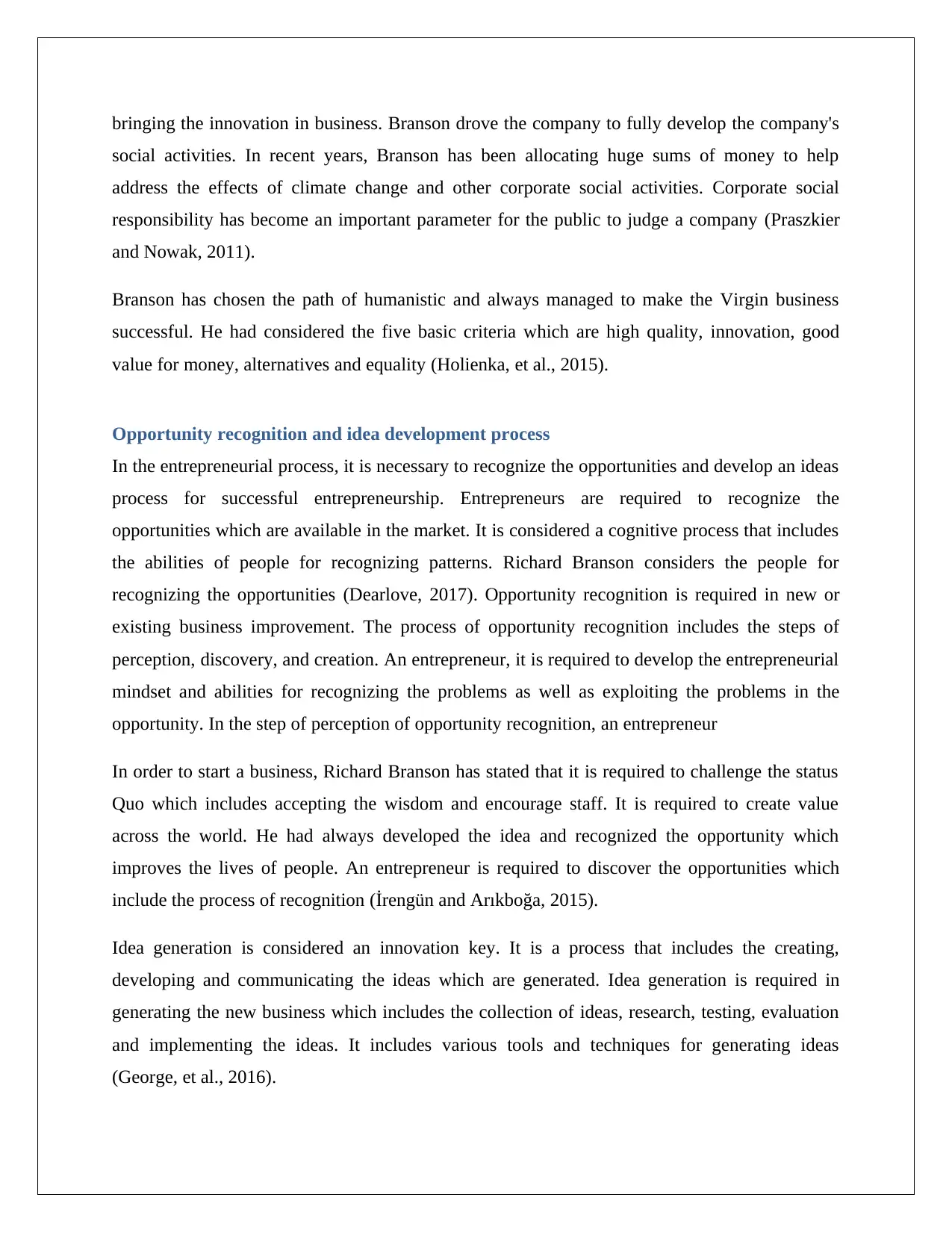
bringing the innovation in business. Branson drove the company to fully develop the company's
social activities. In recent years, Branson has been allocating huge sums of money to help
address the effects of climate change and other corporate social activities. Corporate social
responsibility has become an important parameter for the public to judge a company (Praszkier
and Nowak, 2011).
Branson has chosen the path of humanistic and always managed to make the Virgin business
successful. He had considered the five basic criteria which are high quality, innovation, good
value for money, alternatives and equality (Holienka, et al., 2015).
Opportunity recognition and idea development process
In the entrepreneurial process, it is necessary to recognize the opportunities and develop an ideas
process for successful entrepreneurship. Entrepreneurs are required to recognize the
opportunities which are available in the market. It is considered a cognitive process that includes
the abilities of people for recognizing patterns. Richard Branson considers the people for
recognizing the opportunities (Dearlove, 2017). Opportunity recognition is required in new or
existing business improvement. The process of opportunity recognition includes the steps of
perception, discovery, and creation. An entrepreneur, it is required to develop the entrepreneurial
mindset and abilities for recognizing the problems as well as exploiting the problems in the
opportunity. In the step of perception of opportunity recognition, an entrepreneur
In order to start a business, Richard Branson has stated that it is required to challenge the status
Quo which includes accepting the wisdom and encourage staff. It is required to create value
across the world. He had always developed the idea and recognized the opportunity which
improves the lives of people. An entrepreneur is required to discover the opportunities which
include the process of recognition (İrengün and Arıkboğa, 2015).
Idea generation is considered an innovation key. It is a process that includes the creating,
developing and communicating the ideas which are generated. Idea generation is required in
generating the new business which includes the collection of ideas, research, testing, evaluation
and implementing the ideas. It includes various tools and techniques for generating ideas
(George, et al., 2016).
social activities. In recent years, Branson has been allocating huge sums of money to help
address the effects of climate change and other corporate social activities. Corporate social
responsibility has become an important parameter for the public to judge a company (Praszkier
and Nowak, 2011).
Branson has chosen the path of humanistic and always managed to make the Virgin business
successful. He had considered the five basic criteria which are high quality, innovation, good
value for money, alternatives and equality (Holienka, et al., 2015).
Opportunity recognition and idea development process
In the entrepreneurial process, it is necessary to recognize the opportunities and develop an ideas
process for successful entrepreneurship. Entrepreneurs are required to recognize the
opportunities which are available in the market. It is considered a cognitive process that includes
the abilities of people for recognizing patterns. Richard Branson considers the people for
recognizing the opportunities (Dearlove, 2017). Opportunity recognition is required in new or
existing business improvement. The process of opportunity recognition includes the steps of
perception, discovery, and creation. An entrepreneur, it is required to develop the entrepreneurial
mindset and abilities for recognizing the problems as well as exploiting the problems in the
opportunity. In the step of perception of opportunity recognition, an entrepreneur
In order to start a business, Richard Branson has stated that it is required to challenge the status
Quo which includes accepting the wisdom and encourage staff. It is required to create value
across the world. He had always developed the idea and recognized the opportunity which
improves the lives of people. An entrepreneur is required to discover the opportunities which
include the process of recognition (İrengün and Arıkboğa, 2015).
Idea generation is considered an innovation key. It is a process that includes the creating,
developing and communicating the ideas which are generated. Idea generation is required in
generating the new business which includes the collection of ideas, research, testing, evaluation
and implementing the ideas. It includes various tools and techniques for generating ideas
(George, et al., 2016).
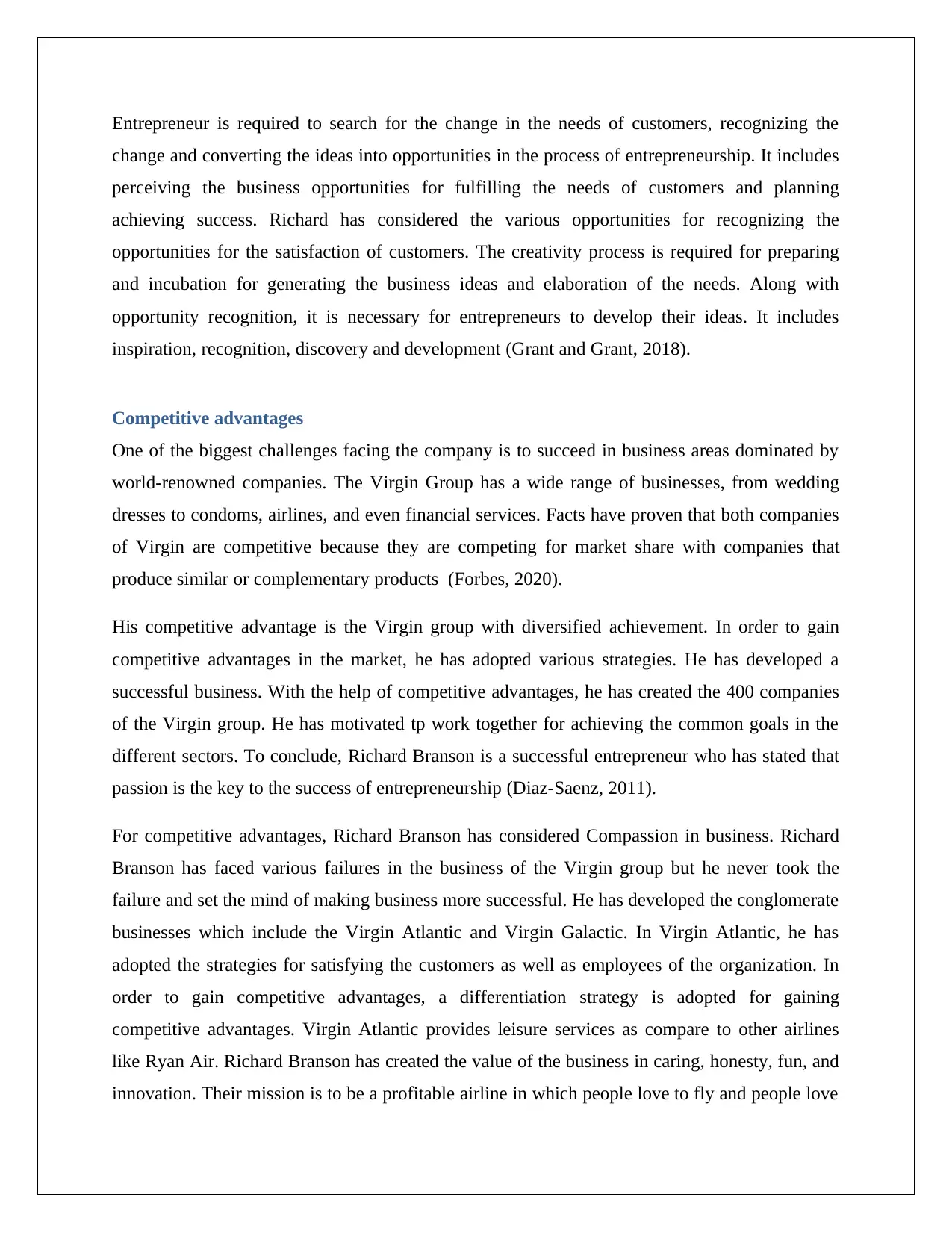
Entrepreneur is required to search for the change in the needs of customers, recognizing the
change and converting the ideas into opportunities in the process of entrepreneurship. It includes
perceiving the business opportunities for fulfilling the needs of customers and planning
achieving success. Richard has considered the various opportunities for recognizing the
opportunities for the satisfaction of customers. The creativity process is required for preparing
and incubation for generating the business ideas and elaboration of the needs. Along with
opportunity recognition, it is necessary for entrepreneurs to develop their ideas. It includes
inspiration, recognition, discovery and development (Grant and Grant, 2018).
Competitive advantages
One of the biggest challenges facing the company is to succeed in business areas dominated by
world-renowned companies. The Virgin Group has a wide range of businesses, from wedding
dresses to condoms, airlines, and even financial services. Facts have proven that both companies
of Virgin are competitive because they are competing for market share with companies that
produce similar or complementary products (Forbes, 2020).
His competitive advantage is the Virgin group with diversified achievement. In order to gain
competitive advantages in the market, he has adopted various strategies. He has developed a
successful business. With the help of competitive advantages, he has created the 400 companies
of the Virgin group. He has motivated tp work together for achieving the common goals in the
different sectors. To conclude, Richard Branson is a successful entrepreneur who has stated that
passion is the key to the success of entrepreneurship (Diaz-Saenz, 2011).
For competitive advantages, Richard Branson has considered Compassion in business. Richard
Branson has faced various failures in the business of the Virgin group but he never took the
failure and set the mind of making business more successful. He has developed the conglomerate
businesses which include the Virgin Atlantic and Virgin Galactic. In Virgin Atlantic, he has
adopted the strategies for satisfying the customers as well as employees of the organization. In
order to gain competitive advantages, a differentiation strategy is adopted for gaining
competitive advantages. Virgin Atlantic provides leisure services as compare to other airlines
like Ryan Air. Richard Branson has created the value of the business in caring, honesty, fun, and
innovation. Their mission is to be a profitable airline in which people love to fly and people love
change and converting the ideas into opportunities in the process of entrepreneurship. It includes
perceiving the business opportunities for fulfilling the needs of customers and planning
achieving success. Richard has considered the various opportunities for recognizing the
opportunities for the satisfaction of customers. The creativity process is required for preparing
and incubation for generating the business ideas and elaboration of the needs. Along with
opportunity recognition, it is necessary for entrepreneurs to develop their ideas. It includes
inspiration, recognition, discovery and development (Grant and Grant, 2018).
Competitive advantages
One of the biggest challenges facing the company is to succeed in business areas dominated by
world-renowned companies. The Virgin Group has a wide range of businesses, from wedding
dresses to condoms, airlines, and even financial services. Facts have proven that both companies
of Virgin are competitive because they are competing for market share with companies that
produce similar or complementary products (Forbes, 2020).
His competitive advantage is the Virgin group with diversified achievement. In order to gain
competitive advantages in the market, he has adopted various strategies. He has developed a
successful business. With the help of competitive advantages, he has created the 400 companies
of the Virgin group. He has motivated tp work together for achieving the common goals in the
different sectors. To conclude, Richard Branson is a successful entrepreneur who has stated that
passion is the key to the success of entrepreneurship (Diaz-Saenz, 2011).
For competitive advantages, Richard Branson has considered Compassion in business. Richard
Branson has faced various failures in the business of the Virgin group but he never took the
failure and set the mind of making business more successful. He has developed the conglomerate
businesses which include the Virgin Atlantic and Virgin Galactic. In Virgin Atlantic, he has
adopted the strategies for satisfying the customers as well as employees of the organization. In
order to gain competitive advantages, a differentiation strategy is adopted for gaining
competitive advantages. Virgin Atlantic provides leisure services as compare to other airlines
like Ryan Air. Richard Branson has created the value of the business in caring, honesty, fun, and
innovation. Their mission is to be a profitable airline in which people love to fly and people love
⊘ This is a preview!⊘
Do you want full access?
Subscribe today to unlock all pages.

Trusted by 1+ million students worldwide
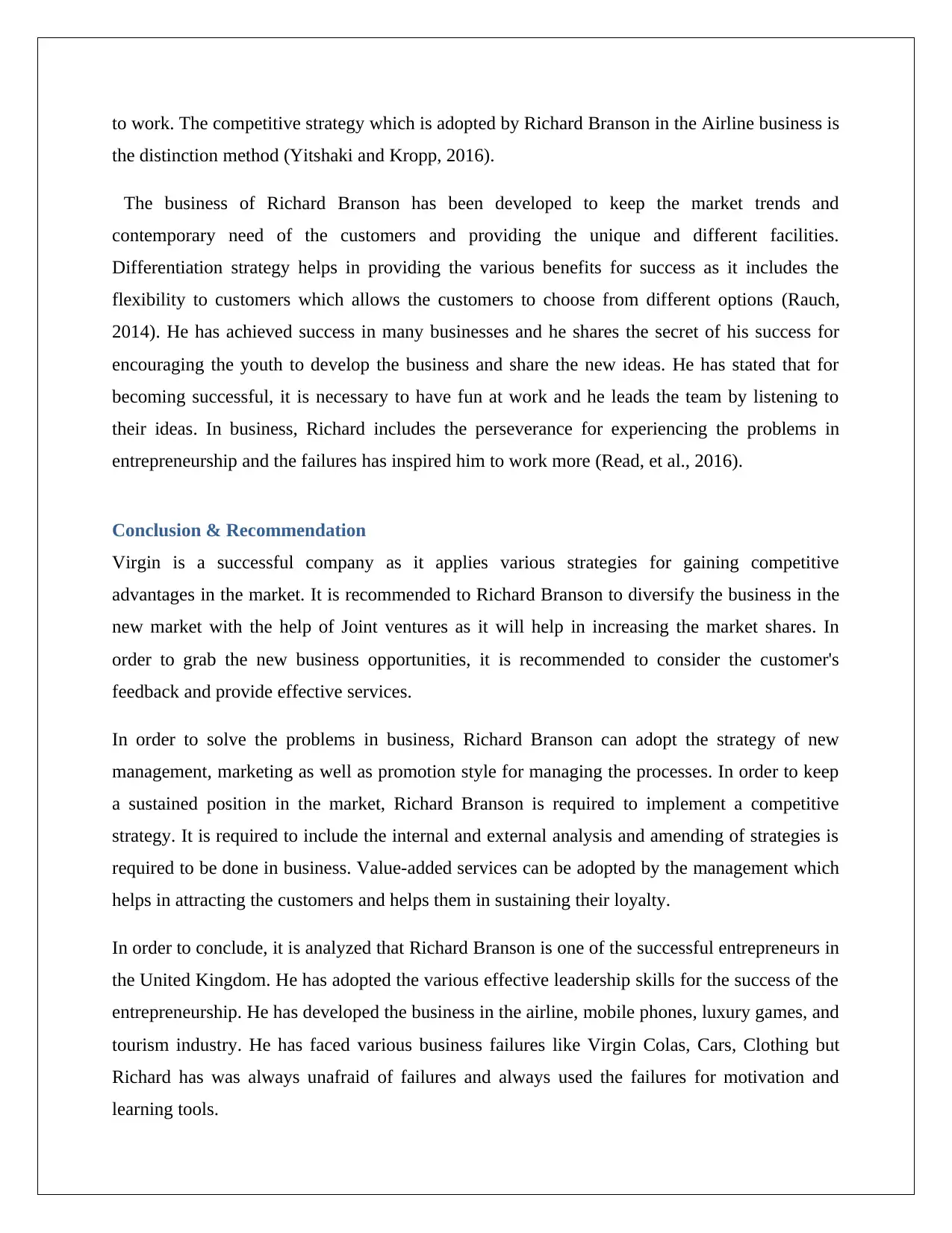
to work. The competitive strategy which is adopted by Richard Branson in the Airline business is
the distinction method (Yitshaki and Kropp, 2016).
The business of Richard Branson has been developed to keep the market trends and
contemporary need of the customers and providing the unique and different facilities.
Differentiation strategy helps in providing the various benefits for success as it includes the
flexibility to customers which allows the customers to choose from different options (Rauch,
2014). He has achieved success in many businesses and he shares the secret of his success for
encouraging the youth to develop the business and share the new ideas. He has stated that for
becoming successful, it is necessary to have fun at work and he leads the team by listening to
their ideas. In business, Richard includes the perseverance for experiencing the problems in
entrepreneurship and the failures has inspired him to work more (Read, et al., 2016).
Conclusion & Recommendation
Virgin is a successful company as it applies various strategies for gaining competitive
advantages in the market. It is recommended to Richard Branson to diversify the business in the
new market with the help of Joint ventures as it will help in increasing the market shares. In
order to grab the new business opportunities, it is recommended to consider the customer's
feedback and provide effective services.
In order to solve the problems in business, Richard Branson can adopt the strategy of new
management, marketing as well as promotion style for managing the processes. In order to keep
a sustained position in the market, Richard Branson is required to implement a competitive
strategy. It is required to include the internal and external analysis and amending of strategies is
required to be done in business. Value-added services can be adopted by the management which
helps in attracting the customers and helps them in sustaining their loyalty.
In order to conclude, it is analyzed that Richard Branson is one of the successful entrepreneurs in
the United Kingdom. He has adopted the various effective leadership skills for the success of the
entrepreneurship. He has developed the business in the airline, mobile phones, luxury games, and
tourism industry. He has faced various business failures like Virgin Colas, Cars, Clothing but
Richard has was always unafraid of failures and always used the failures for motivation and
learning tools.
the distinction method (Yitshaki and Kropp, 2016).
The business of Richard Branson has been developed to keep the market trends and
contemporary need of the customers and providing the unique and different facilities.
Differentiation strategy helps in providing the various benefits for success as it includes the
flexibility to customers which allows the customers to choose from different options (Rauch,
2014). He has achieved success in many businesses and he shares the secret of his success for
encouraging the youth to develop the business and share the new ideas. He has stated that for
becoming successful, it is necessary to have fun at work and he leads the team by listening to
their ideas. In business, Richard includes the perseverance for experiencing the problems in
entrepreneurship and the failures has inspired him to work more (Read, et al., 2016).
Conclusion & Recommendation
Virgin is a successful company as it applies various strategies for gaining competitive
advantages in the market. It is recommended to Richard Branson to diversify the business in the
new market with the help of Joint ventures as it will help in increasing the market shares. In
order to grab the new business opportunities, it is recommended to consider the customer's
feedback and provide effective services.
In order to solve the problems in business, Richard Branson can adopt the strategy of new
management, marketing as well as promotion style for managing the processes. In order to keep
a sustained position in the market, Richard Branson is required to implement a competitive
strategy. It is required to include the internal and external analysis and amending of strategies is
required to be done in business. Value-added services can be adopted by the management which
helps in attracting the customers and helps them in sustaining their loyalty.
In order to conclude, it is analyzed that Richard Branson is one of the successful entrepreneurs in
the United Kingdom. He has adopted the various effective leadership skills for the success of the
entrepreneurship. He has developed the business in the airline, mobile phones, luxury games, and
tourism industry. He has faced various business failures like Virgin Colas, Cars, Clothing but
Richard has was always unafraid of failures and always used the failures for motivation and
learning tools.
Paraphrase This Document
Need a fresh take? Get an instant paraphrase of this document with our AI Paraphraser
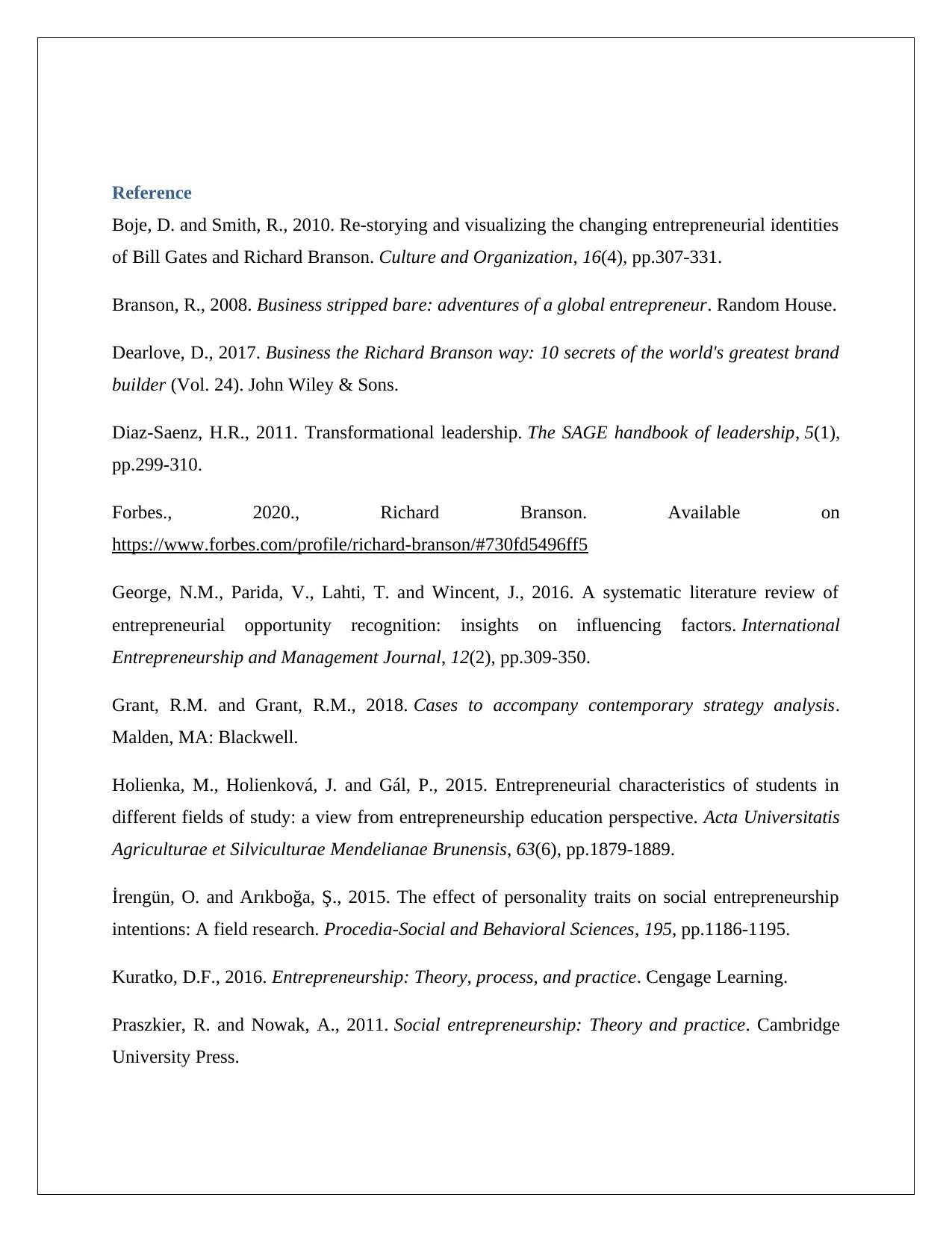
Reference
Boje, D. and Smith, R., 2010. Re‐storying and visualizing the changing entrepreneurial identities
of Bill Gates and Richard Branson. Culture and Organization, 16(4), pp.307-331.
Branson, R., 2008. Business stripped bare: adventures of a global entrepreneur. Random House.
Dearlove, D., 2017. Business the Richard Branson way: 10 secrets of the world's greatest brand
builder (Vol. 24). John Wiley & Sons.
Diaz-Saenz, H.R., 2011. Transformational leadership. The SAGE handbook of leadership, 5(1),
pp.299-310.
Forbes., 2020., Richard Branson. Available on
https://www.forbes.com/profile/richard-branson/#730fd5496ff5
George, N.M., Parida, V., Lahti, T. and Wincent, J., 2016. A systematic literature review of
entrepreneurial opportunity recognition: insights on influencing factors. International
Entrepreneurship and Management Journal, 12(2), pp.309-350.
Grant, R.M. and Grant, R.M., 2018. Cases to accompany contemporary strategy analysis.
Malden, MA: Blackwell.
Holienka, M., Holienková, J. and Gál, P., 2015. Entrepreneurial characteristics of students in
different fields of study: a view from entrepreneurship education perspective. Acta Universitatis
Agriculturae et Silviculturae Mendelianae Brunensis, 63(6), pp.1879-1889.
İrengün, O. and Arıkboğa, Ş., 2015. The effect of personality traits on social entrepreneurship
intentions: A field research. Procedia-Social and Behavioral Sciences, 195, pp.1186-1195.
Kuratko, D.F., 2016. Entrepreneurship: Theory, process, and practice. Cengage Learning.
Praszkier, R. and Nowak, A., 2011. Social entrepreneurship: Theory and practice. Cambridge
University Press.
Boje, D. and Smith, R., 2010. Re‐storying and visualizing the changing entrepreneurial identities
of Bill Gates and Richard Branson. Culture and Organization, 16(4), pp.307-331.
Branson, R., 2008. Business stripped bare: adventures of a global entrepreneur. Random House.
Dearlove, D., 2017. Business the Richard Branson way: 10 secrets of the world's greatest brand
builder (Vol. 24). John Wiley & Sons.
Diaz-Saenz, H.R., 2011. Transformational leadership. The SAGE handbook of leadership, 5(1),
pp.299-310.
Forbes., 2020., Richard Branson. Available on
https://www.forbes.com/profile/richard-branson/#730fd5496ff5
George, N.M., Parida, V., Lahti, T. and Wincent, J., 2016. A systematic literature review of
entrepreneurial opportunity recognition: insights on influencing factors. International
Entrepreneurship and Management Journal, 12(2), pp.309-350.
Grant, R.M. and Grant, R.M., 2018. Cases to accompany contemporary strategy analysis.
Malden, MA: Blackwell.
Holienka, M., Holienková, J. and Gál, P., 2015. Entrepreneurial characteristics of students in
different fields of study: a view from entrepreneurship education perspective. Acta Universitatis
Agriculturae et Silviculturae Mendelianae Brunensis, 63(6), pp.1879-1889.
İrengün, O. and Arıkboğa, Ş., 2015. The effect of personality traits on social entrepreneurship
intentions: A field research. Procedia-Social and Behavioral Sciences, 195, pp.1186-1195.
Kuratko, D.F., 2016. Entrepreneurship: Theory, process, and practice. Cengage Learning.
Praszkier, R. and Nowak, A., 2011. Social entrepreneurship: Theory and practice. Cambridge
University Press.
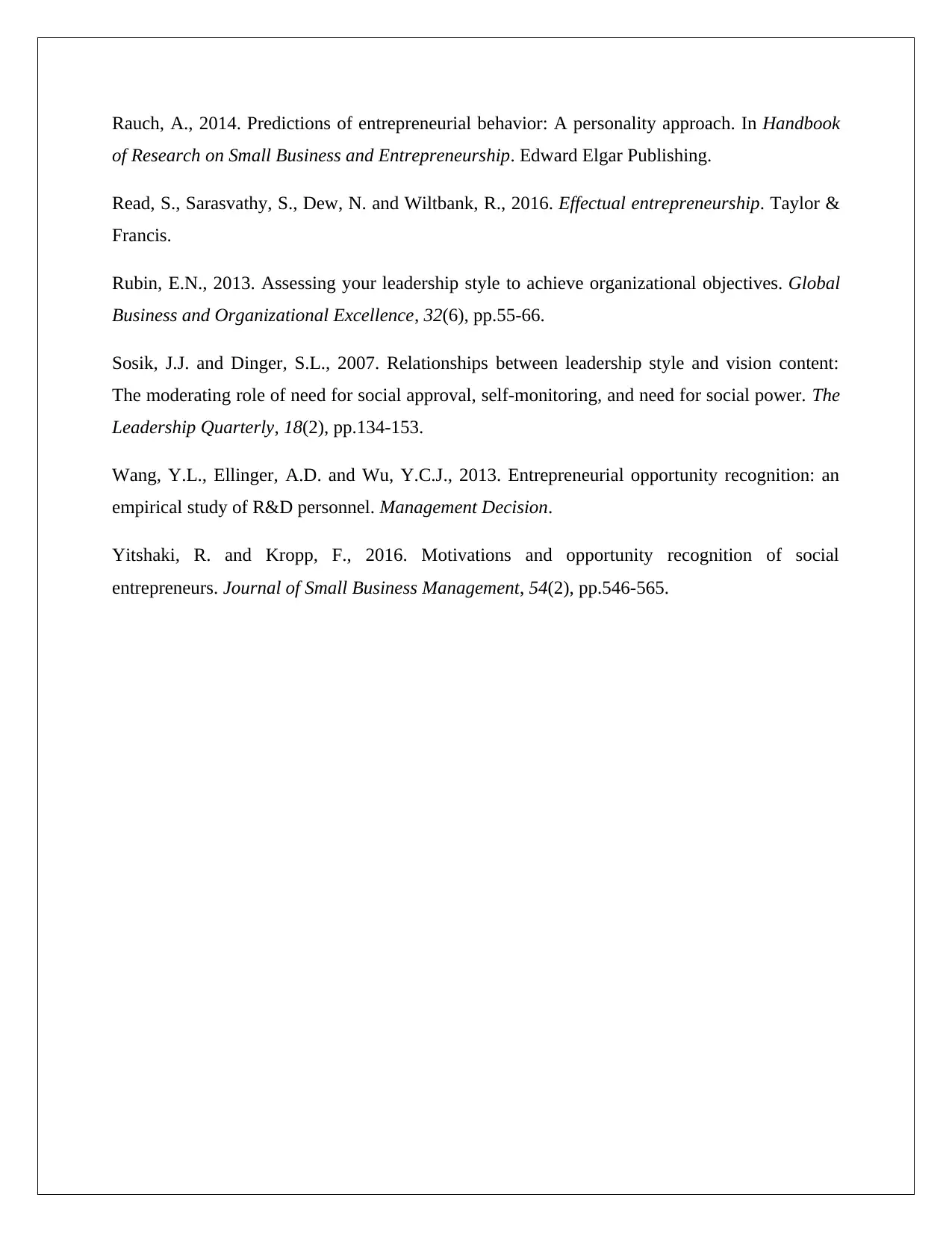
Rauch, A., 2014. Predictions of entrepreneurial behavior: A personality approach. In Handbook
of Research on Small Business and Entrepreneurship. Edward Elgar Publishing.
Read, S., Sarasvathy, S., Dew, N. and Wiltbank, R., 2016. Effectual entrepreneurship. Taylor &
Francis.
Rubin, E.N., 2013. Assessing your leadership style to achieve organizational objectives. Global
Business and Organizational Excellence, 32(6), pp.55-66.
Sosik, J.J. and Dinger, S.L., 2007. Relationships between leadership style and vision content:
The moderating role of need for social approval, self-monitoring, and need for social power. The
Leadership Quarterly, 18(2), pp.134-153.
Wang, Y.L., Ellinger, A.D. and Wu, Y.C.J., 2013. Entrepreneurial opportunity recognition: an
empirical study of R&D personnel. Management Decision.
Yitshaki, R. and Kropp, F., 2016. Motivations and opportunity recognition of social
entrepreneurs. Journal of Small Business Management, 54(2), pp.546-565.
of Research on Small Business and Entrepreneurship. Edward Elgar Publishing.
Read, S., Sarasvathy, S., Dew, N. and Wiltbank, R., 2016. Effectual entrepreneurship. Taylor &
Francis.
Rubin, E.N., 2013. Assessing your leadership style to achieve organizational objectives. Global
Business and Organizational Excellence, 32(6), pp.55-66.
Sosik, J.J. and Dinger, S.L., 2007. Relationships between leadership style and vision content:
The moderating role of need for social approval, self-monitoring, and need for social power. The
Leadership Quarterly, 18(2), pp.134-153.
Wang, Y.L., Ellinger, A.D. and Wu, Y.C.J., 2013. Entrepreneurial opportunity recognition: an
empirical study of R&D personnel. Management Decision.
Yitshaki, R. and Kropp, F., 2016. Motivations and opportunity recognition of social
entrepreneurs. Journal of Small Business Management, 54(2), pp.546-565.
⊘ This is a preview!⊘
Do you want full access?
Subscribe today to unlock all pages.

Trusted by 1+ million students worldwide
1 out of 9
Related Documents
Your All-in-One AI-Powered Toolkit for Academic Success.
+13062052269
info@desklib.com
Available 24*7 on WhatsApp / Email
![[object Object]](/_next/static/media/star-bottom.7253800d.svg)
Unlock your academic potential
Copyright © 2020–2026 A2Z Services. All Rights Reserved. Developed and managed by ZUCOL.



